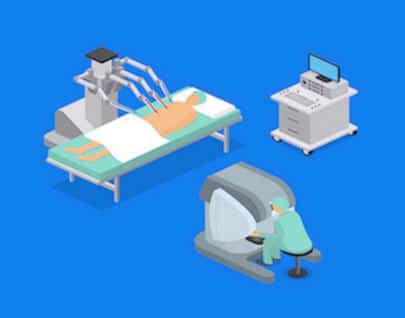
Advances in surgical robotics are changing procedures for the better for many patients. The precision possible with robot-assisted surgery minimizes the impact on your body, promoting shorter recovery times and more effective treatment.
Contemporary robotic equipment translates the instructions of your surgeon, Dr. Candela or Dr. Schreier, to microscopically pinpoint surgical attention on target tissue, avoiding damage to surrounding healthy tissue. Such damage is an unwanted but necessary consequence of traditional open surgery.
Surgeries of the colon are particularly well-served by robotic assistance. Deep in your abdomen, problem areas of the large intestine hide behind thick layers of muscle that need to be cut and pulled aside with conventional surgical approaches. Manually operated laparoscopic surgery can avoid large incisions, but it may hamper the surgeon with equipment limitations and poor ergonomics.
Robotic assistance leaves the surgeon in charge and able to perform incredibly precise tasks inside your body. If you have diverticulitis or colon cancer, robotic surgery can revolutionize your treatment.
The effects of diverticulitis
Many people, particularly those over the age of 40, develop small pouches throughout their digestive system. Called diverticula, these usually have no effect on your health, though you have a condition called diverticulosis. Sometimes, these bulges may become inflamed or infected, leading to signs and symptoms of a more serious condition called diverticulitis. This condition often includes:
- Tenderness, bloating, or pain through your abdomen
- Constipation and/or diarrhea
- Nausea and/or vomiting
- Signs of infection such as fever and high white blood cell counts
- Elevated blood pressure
- Increased urinary urgency
While some cases of diverticulitis may be treated with diet changes or medication, symptoms that continue may require surgery, particularly if: complications set in; your immune system is compromised such as after cancer treatment; or if an intestinal blockage occurs.
Partial colectomy surgery
Diverticulitis may sometimes be treated by removing part of the colon that has inflamed or infected diverticula. Some cancer treatments are also well-suited to a similar procedure, such as when early-stage cancers are found.
Partial colectomy surgery removes only the portion of the colon that’s affected by diverticulitis or cancer. Sometimes called bowel resection or subtotal colectomy, this procedure can often leave your colon otherwise intact, avoiding the need for additional procedures to create alternate routes for waste evacuation, typically colostomy surgery.
Benefits of robot-assisted surgery
Generally speaking, surgical procedures that can be performed using laparoscopic techniques instead of conventional open surgery offer you benefits such as reduced blood loss, less post-operative pain, and faster healing. Laparoscopic surgery uses small incisions, leading to the name “keyhole surgery.” Cameras and surgical tools enter the target area through incisions less than an inch long, and the impact on muscle and other tissue is minimized, compared with open surgery, which requires access for the surgeon’s hands to operate tools.
Conventional laparoscopy, though, has its own limitations. Since surgical tools are still directly handled by the surgeon but now through the restricted, smaller incisions, movements may be more complex and restricted by the articulation of manual equipment.
Robotic tools free up the surgeon to more accurately guide both tools and cameras for surgical navigation. The resolution of movement of robot-controlled surgical tools is much finer than the steadiest human hand, and the surgical robot doesn’t get tired when its arms are required to hold a position a surgeon would find awkward under manual control.
For the colectomy patient, this adds up to the most precise and most minimally invasive procedure to address the sections of the colon affected by cancer or diverticulitis. Contact Dr Schreier or Dr. Candela to learn more about robotic colon surgery and how it may help you.

